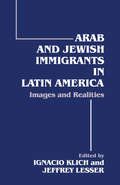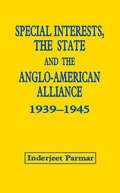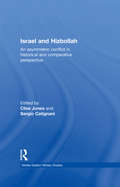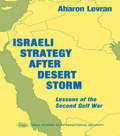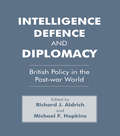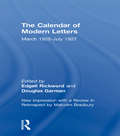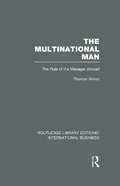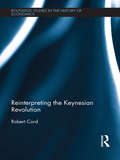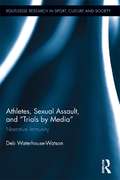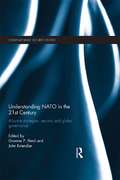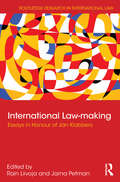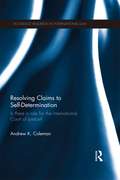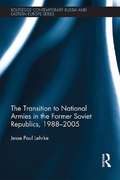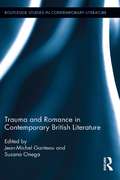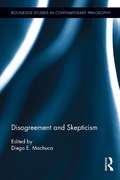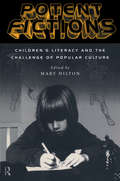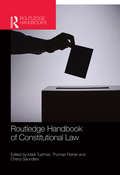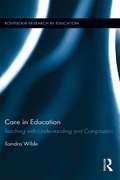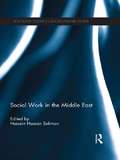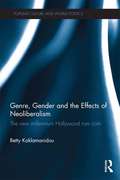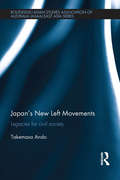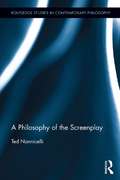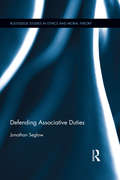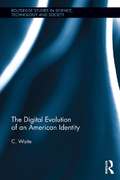Special Collections
Benetech’s Global Certified Accessible Titles
Description: Benetech’s GCA program is the first independent third-party EPUB certification to verify ebook accessibility. By creating content that is born accessible, publishers can meet the needs of all readers. Learn more: https://bornaccessible.benetech.org/
- Table View
- List View
Arab and Jewish Immigrants in Latin America
by Jeffrey Lesser and Ignacio KlichThis collection of essays addresses various aspects of Arab and Jewish immigration and acculturation in Latin America. The volume examines how the Latin American elites who were keen to change their countries' ethnic mix felt threatened by the arrival of Arabs and Jews.
Special Interests, the State and the Anglo-American Alliance, 1939-1945
by Inderjeet ParmarThis book aims to enhance our understanding of the Anglo-American alliance by examining the origins of the alliance during the Second World War. It presents a case study of how power is distributed in British society, and who makes the political decisions that decisively shape the society and world in which we live.
Israel and Hizbollah
by Clive Jones and Sergio CatignaniThis book examines the local and international dynamics and strategies that have come to define the often violent relationship between Israel and Lebanon. Since the end of the Cold War, academic debate over the nature of war in the contemporary world has focused upon the asymmetric nature of conflict among a raft of failed or failing states, often held together by only a fragile notion of a shared communal destiny. Little scholarly attention has been paid, however, to one such conflict that predates the ending of the Cold War, yet still appears as intractable as ever: Israel's hostile relationship with Lebanon and in particular, its standoff with the Lebanese Shi'a militia group, Hizbollah. As events surrounding the 'Second Lebanon War' in the summer of 2006 demonstrate, the clear potential for further cross border violence as well as the potential for a wider regional conflagration that embraces Damascus and Tehran remains as acute as ever. This book focuses on the historical background of the conflict, while also considering the role that other external actors, most notably Syria, Iran and the United Nations, play in influencing the conduct and outcomes of the Israeli-Lebanese conflict. In addition, it also looks at Hizbollah's increasing sway in Lebanese domestic politics, its increased military cooperation with Iran and Syria, and the implications of such developments. This book will be of much interest to students of Middle Eastern politics, War and Conflict Studies, International Security and International Relations in general. Clive Jones is Professor of Middle East Studies and International Politics in the School of Politics and International Studies (POLIS), University of Leeds, UK. His books include Soviet Jewish Aliyah 1989-92 (1996), Israel: Challenges to Democracy, Identity and the State (with Emma Murphy, 2002), and co-editor The al-Aqsa Intifada: Between Terrorism and Civil War (2005). Sergio Catignani is Lecturer in Security and Strategic Studies and MA Programme Director for the MA in Security and Strategic Studies at the Department of Politics, University of Sussex. He is the author of Israeli Counter-Insurgency and the Intifadas: Dilemmas of a Conventional Army (2008).
Israeli Strategy After Desert Storm
by Aharon LevranIraq's invasion of Kuwait and the Gulf War had a traumatic effect on the Middle East and its implications were particularly serious for Israel, which felt obliged to reassess its strategic and military perspectives. This is an examination of the lessons that the Gulf War holds for Israel.
Wittgenstein, Theory and the Arts
by Richard Allen and Malcolm TurveyThis is the first full exploration of the implications of Wittgenstein's philosophy for understanding the arts and cultural criticism. These original essays by philosophers and critics address key philosophical topics in the study of the arts and culture, such as humanism, criticism, psychology, painting, film and ethics. All exemplify Wittgenstein's method of conceptual investigation and highlight his notion of philosophy as a cure.
Intelligence, Defence and Diplomacy
by Richard J. Aldrich and Michael F. HopkinsWhat was Britain's reaction to the death of Stalin? How has Britain reconciled a modern nuclear strategy with its traditional imperial defence commitments around the world? How has secret intelligence affected the Special Relationship' since 1945? Certain clear questions and perennial themes run through British overseas policy since 1945. This book examines them, drawing on new research by leading historians and scholars in the field.
Calendar Modern Letts 4v Cb
by Edgell Rickword and D. GarmanFirst Published in 1966. Routledge is an imprint of Taylor & Francis, an informa company.
The Multinational Man
by Thomas AitkenThe growth and proliferation of multinational companies has both imposed new responsibilities on and offered new opportunities to, the men who represent them around the world. This book dissects the functional responsibilities of the manager abroad in the light of his relationships with the home office and with his local environment, and explores the consequences of various types of relationships. The discussion is a practical one drawing heavily on a wealth of experience and actual case studies.
Reinterpreting The Keynesian Revolution
by Robert CordVarious explanations have been put forward as to why the Keynesian Revolution in economics in the 1930s and 1940s took place. Some of these point to the temporal relevance of John Maynard Keynes's The General Theory of Employment, Interest, and Money (1936), appearing, as it did, just a handful of years after the onset of the Great Depression, whilst others highlight the importance of more anecdotal evidence, such as Keynes’s close relations with the Cambridge ‘Circus’, a group of able, young Cambridge economists who dissected and assisted Keynes in developing crucial ideas in the years leading up to the General Theory. However, no systematic effort has been made to bring together these and other factors to examine them from a sociology of science perspective. This book fills this gap by taking its cue from a well-established tradition of work from history of science studies devoted to identifying the intellectual, technical, institutional, psychological and financial factors which help to explain why certain research schools are successful and why others fail. This approach, it turns out, provides a coherent account of why the revolution in macroeconomics was ‘Keynesian’ and why, on a related note, Keynes was able to see off contemporary competitor theorists, notably Friedrich von Hayek and Michal Kalecki.
Athletes, Sexual Assault, and Trials by Media
by Deb Waterhouse-WatsonSince footballer sexual assault became top news in 2004, six years after the first case was reported, much has been written in the news media about individual cases, footballers and women who have sex with them. Deb Waterhouse-Watson reveals how media representations of recent sexual assault cases involving Australian footballers amount to "trials by media", trials that result in acquittal. The stories told about footballers and women in the news media evoke stereotypes such as the "gold digger", "woman scorned" and the "predatory woman", which cast doubt on the alleged victims’ claims and suggest that they are lying. Waterhouse-Watson calls this a "narrative immunity" for footballers against allegations of sexual assault. This book details how popular conceptions of masculinity and femininity inform the way footballers’ bodies, team bonding, women, sex and alcohol are portrayed in the media, and connects stories relating to the cases with sports reporting generally. Uncovering similar patterns of narrative, grammar and discourse across these distinct yet related fields, Waterhouse-Watson shows how these discourses are naturalised, with reports on the cases intertwining with broader discourses of football reporting to provide immunity. Despite the prevalence of stories that discredit the alleged victims, Waterhouse-Watson also examines attempts to counter these pervasive rape myths, articulating successful strategies and elucidating the limitations built into journalistic practices, and language itself.
Understanding NATO in the 21st Century
by John Kriendler and Graeme HerdUnderstanding NATO in the 21st Century enhances existing strategic debates and clarifies thinking as to the direction and scope of NATO’s potential evolution in the 21st century. The book seeks to identify the possible contours and trade-offs embedded within a potential third "Transatlantic Bargain" in the context of a U.S. strategic pivot in a "Pacific Century". To that end, it explores the internal adaptation of the Alliance, evaluates the assimilation of NATO's erstwhile adversaries, and provides a focus on NATO’s operational future and insights into the new threats NATO faces and its responses. Each contribution follows a similar broad tripartite structure: an examination of the historical context in which the given issue or topic has evolved; an identification and characterization of key contemporary policy debates and drivers that shape current thinking; and, on that basis, a presentation of possible future strategic pathways or scenarios relating to the topic area. This book will appeal to students of NATO, international security and international relations in general.
International Law-making
by Rain Liivoja and Jarna PetmanThis book explores law-making in international affairs and is compiled to celebrate the 50th birthday of Professor Jan Klabbers, a leading international law and international relations scholar who has made significant contributions to the understanding of the sources of international legal obligations and the idea of constitutionalism in international law. Inspired by Professor Klabbers’ wide-ranging interests in international law and his interdisciplinary approach, the book examines law-making through a variety of perspectives and seeks to breaks new ground in exploring what it means to think and write about law and its creation. While examining the substance of international law, these contributors raise more general concerns, such as the relationship between law-making and the application of law, the role and conflict between various institutions, and the characteristics of the formal sources of international law. The book will be of great interest to students and academics of legal theory, international relations, and international law.
Resolving Claims to Self-Determination
by Andrew ColemanSince the end of World War Two and the formation of the UN, the nature of warfare has undergone changes with many wars being ‘intra-state’ wars, or wars of secession. Whilst wars of secession do not involve the same number or type of combatants as in the last two World Wars, their potential for destruction and their danger for the international community cannot be underestimated. There are currently many peoples seeking independence from what they perceive as foreign and alien rulers including the Chechens, West Papuans, Achenese, Tibetans, and the Kurds. The break-up of Yugoslavia and the former USSR, together with recent conflicts in South Ossetia, reveal that the potential for future wars of secession remains high. This book explores the relationship between recognition, statehood and self-determination, and shows how self-determination continues to be relevant beyond European decolonisation. The book considers how and why unresolved questions of self-determination have the potential to become violent. The book goes on to investigate whether the International Court of Justice, as the primary judicial organ of the United Nations, could successfully resolve questions of self-determination through the application of legal analysis and principles of international law. By evaluating the strengths, weaknesses and effectiveness of the Court’s advisory jurisdiction, Andrew Coleman asks whether the ICJ is a suitable forum for these questions, and asks what changes would be necessary to provide an effective means for the peaceful "birth" of States.
The Transition to National Armies in the Former Soviet Republics, 1988-2005
by Jesse Paul LehrkeThis book looks at the militaries of the late-Soviet and post-Soviet republics. Beginning with the end of the Soviet era, it recognises that the successor states did not spring from nowhere, but inherited a legacy that influenced all that followed. The book discusses how politicians control the instruments that are the manifestation of the state’s monopoly on violence, and how society views and supports the military. By taking a bottom up empirical approach that examines the personnel, leaders, organisations and institutions, and their outlook and attitudes, the book presents a comprehensive picture of the armed forces, showing how the armed forces are very significantly shaped by the surrounding political and social environment. The book goes on to examine the armed forces in action, and highlights that to truly understand the militaries, studies need to go beyond looking at the static structures.
Trauma and Romance in Contemporary British Literature
by Susana Onega and Jean-Michel GanteauDrawing on a variety of theoretical approaches including trauma theory, psychoanalysis, genre theory, narrative theory, theories of temporality, cultural theory, and ethics, this book breaks new ground in bringing together trauma and romance, two categories whose collaboration has never been addressed in such a systematic and in-depth way. The volume shows how romance strategies have become an essential component of trauma fiction in general and traumatic realism in particular. It brings to the fore the deconstructive powers of the darker type of romance and its adequacy to perform traumatic acting out and fragmentation. It also zooms in on the variations on the ghost story as medium for the evocation of trans-generational trauma, as well as on the therapeutic drive of romance that favors a narrative presentation of the working-through phase of trauma. Chapters explore various acceptations and extensions of psychic trauma, from the individual to the cultural, analyzing narrative texts that belong in various genres from the ghost story to the misery memoir to the graphic novel. The selection of primary sources allows for a review of leading contemporary British authors such as Peter Ackroyd, Martin Amis, Ian McEwan, Salman Rushdie, Graham Swift, Sarah Waters and Jeanette Winterson, and of those less canonical such as Jackie Kay, Alan Moore and Dave Gibbons, Justine Picardie, Peter Roche and Adam Thorpe.
Disagreement and Skepticism
by Diego E. MachucaThe thirteen essays in this volume explore for the first time the possible skeptical implications of disagreement in different areas and from different perspectives, with an emphasis in the current debate about the epistemic significance of disagreement. They represent a new contribution to the study of the connection between disagreement and skepticism in epistemology, metaethics, ancient philosophy, and metaphilosophy.
Potent Fictions
by Mary HiltonToday's children spend more time than ever before watching television, playing computer games and reading comic and pulp fiction. Many of these are directly designed by the toy and media industry. Are children therefore simply being manipulated? There is widespread concern that because of these kinds of popular fiction, children do not read `quality' literature, resulting in lower standards of literacy. There is also the further fear that because many of these popular media portray highly stereotyped, gendered images, this too will have a damaging effect on children. Mary Hilton's fascinating book proves that there is another side to the argument. We do not have to view popular culture as a threat to our children or their education. The writers of this collection show how, used carefully alongside other types of literature, popular culture can actually help teachers to develop literacy in a broad and positive sense.
Routledge Handbook of Constitutional Law
by Mark Tushnet and Cheryl Saunders and Thomas FleinerThe Routledge Handbook of Constitutional Law is an advanced level reference work which surveys the current state of constitutional law. Featuring new, specially commissioned papers by a range of leading scholars from around the world, it offers a comprehensive overview of the field as well as identifying promising avenues for future research. The book presents the key issues in constitutional law thematically allowing for a truly comparative approach to the subject. It also pays particular attention to constitutional design, identifying and evaluating various solutions to the challenges involved in constitutional architecture. The book is split into four parts for ease of reference: Part One: General issues "sets issues of constitutional law firmly in context including topics such as the making of constitutions, the impact of religion and culture on constitutions, and the relationship between international law and domestic constitutions. Part Two: Structures presents different approaches in regard to institutions or state organization and structural concepts such as emergency powers and electoral systems Part Three: Rights covers the key rights often enshrined in constitutions Part Four: New Challenges - explores issues of importance such as migration and refugees, sovereignty under pressure from globalization, Supranational Organizations and their role in creating post-conflict constitutions, and new technological challenges. Providing up-to-date and authoritative articles covering all the key aspects of constitutional law, this reference work is essential reading for advanced students, scholars and practitioners in the field.
Care in Education
by Sandra WildeThis philosophical commentary explores the meaning and significance of care in education, demonstrating how teaching with care enriches the art and soul of pedagogy. Wilde draws upon Western and Eastern philosophies that envision an integrated image of care to illuminate the value of cultivating understanding in the form of awareness, and compassion leading to right action. Comments and stories from teachers’ experiences demonstrate important aspects of care that are easily overlooked, such as present attention, listening and teacher, well-being. Although it uncovers a tragic conflict between caring and aspects of contemporary schooling, this book offers hope for teachers. It shares a vision of practice that has the potential to re-enliven and strengthen care even in the midst of these difficulties. It also offers a contemplative approach to pedagogy that calls educators into intentional action, showing them how to renew their deep ethical connections to students, to subject matter and to the world.
Social Work in the Middle East
by Hussein Hassan SolimanCountries across the Middle East face a number of social problems such as poverty, unemployment, housing, internal immigration and caring for vulnerable groups such as children, women, the disabled and the elderly. Providing an overview of the wide range of social issues addressed by social work practitioners, this book reveals the impact of the region’s distinct historical and cultural factors, traditions, and customs and applications on social welfare and social work practice. Examining social work education and practice across a number of countries including Egypt, Palestine, Jordan, Saudi Arabia, Lebanon, Oman and Sudan this book examines and assesses the diverse nature of social work in these countries and the role of the profession in providing essential services to different client groups. This in turn illustrates how social work as a profession contributes to the welfare system in the Middle East, and the relationship and interaction between social work professionals and governments. Further, the contributors demonstrate the religious, historical, ideological, cultural and geographical factors that influence social work practice and delivery in the region, with particular attention paid to the role of Islam in guiding and shaping social welfare institutions and the practice of social services. Bringing together the work of scholars from across the Middle East, this book will be welcomed by students, scholars and practitioners interested in the sociology, politics and culture of the Middle East, international social work and social welfare.
Genre, Gender and the Effects of Neoliberalism
by Betty KaklamanidouThe romantic comedy has long been regarded as an inferior film genre by critics and scholars alike, accused of maintaining a strict narrative formula which is considered superficial and highly predictable. However, the genre has resisted the negative scholarly and critical comments and for the last three decades the steady increase in the numbers of romantic comedies position the genre among the most popular ones in the globally dominant Hollywood film industry. The enduring power of the new millennium romantic comedy, proves that therein lies something deeper and worth investigating. This new work draws together a discussion of the full range of romantic comedies in the new millennium, exploring the cycles of films that tackle areas including teen romance, the new career woman, women as action heroes, motherhood and pregnancy and the mature millennium woman. The work evaluates the structure of these different types of films and examines in detail the ways in which they choose to frame key contemporary issues which influence how we analyse global politics, including gender, class, race and society. Providing a rich understanding of the complexities and potential of the genre for understanding contemporary society, this work will be of interest to students and scholars of cultural & film studies, gender & politics and world politics in general.
Japan's New Left Movements
by Takemasa AndoThe Fukushima Daiichi nuclear accident that followed the March 2011 tsunami and earthquake in Japan shocked the world. In the wake the of the disaster, questions were asked as to why Japanese antinuclear movements were not able to prevent those with vested interests, such as businesses, bureaucrats, the media and academics, from facilitating nuclear energy policies? Taking this question as its starting point, this book looks more widely at the development and powerlessness of Japanese civil society, and seeks to untangle this intersection between social movements and civil society in postwar Japan. Central to this book are the Japanese New Left movements that emerged in the 1960s and 1970s, and the impact they have had on civil society and politics. By focusing on a key idea that a wide range of new leftists shared – the self-revolution in ‘everydayness’ – Takemasa Ando shows how these groups did not seek immediate change in the realms of politics and legislation, but rather, it was believed that personal transformation would lead to broader social and political change. By reconsidering the relationship between Japanese New Left movements of the 1960s and later social movements, this book crucially connects the constructive and disruptive legacies of the movements, and in doing so provides valuable insights into the powerlessness that plagues Japanese civil society today. Presenting a comprehensive picture of the New Left movements and their legacies in Japan, this book will be of great interest to students and scholars working in the fields of Japanese politics, Japanese history, and Japanese culture and society.
A Philosophy of the Screenplay
by Ted NannicelliRecently, scholars in a variety of disciplines—including philosophy, film and media studies, and literary studies—have become interested in the aesthetics, definition, and ontology of the screenplay. To this end, this volume addresses the fundamental philosophical questions about the nature of the screenplay: What is a screenplay? Is the screenplay art—more specifically, literature? What kind of a thing is a screenplay? Nannicelli argues that the screenplay is a kind of artefact; as such, its boundaries are determined collectively by screenwriters, and its ontological nature is determined collectively by both writers and readers of screenplays. Any plausible philosophical account of the screenplay must be strictly constrained by our collective creative and appreciative practices, and must recognize that those practices indicate that at least some screenplays are artworks.
Defending Associative Duties
by Jonathan SeglowThis book explores the associative duties we owe to our children, parents, friends, colleagues, associates and compatriots and defends a novel account which justifies such duties through the realization of values that are produced in these various kinds of social relationships. Seglow engages with several key contemporary debates including parental rights over children’s education, the burdens of eldercare, permissible partiality to friends, and global justice versus compatriot duties.
The Digital Evolution of an American Identity
by C. WaiteThe Digital Evolution of an American Identity details how the concept of American individualism is challenged by the digital revolution. As digital media alter our print-dominant culture, assumptions regarding the relationship of the individual to the larger community become increasingly problematic. Current arguments regarding freedom of speech and confusion about what is meant by privacy illustrate the nature of the challenge. C. Waite defines individualism as the ways in which the American culture traditionally strives to balance the rights of the individual against the needs of the group. Americans struggle to understand what it means to be responsible both for one’s self and for the welfare of others. They struggle with this not as an academic might, but in concrete and specific cases, often caught at cross-purposes with conflicting goods. This is a historic struggle, intrinsic to the very fabric of America's democratic society, as illustrated by its laws and customs. The American democracy has supported a view of the person as an autonomous individual. Yet that concept of American individualism no longer adequately captures the role of the self in the social world. The digital environment challenges that autonomy by creating new avenues for speech and new forms of social networks. Though the transition from a print-based culture to the digital domain entails a global revolution, American culture will suffer the consequences of that revolution more profoundly than other cultures because the concept of American individualism is foundational to its democratic way of life.
